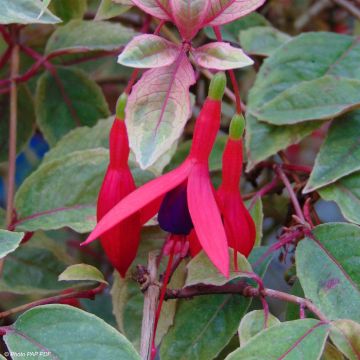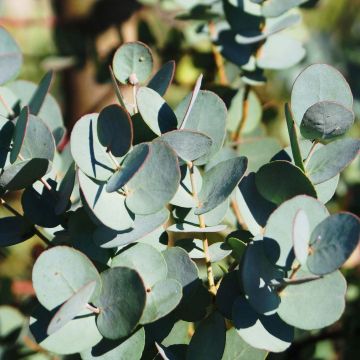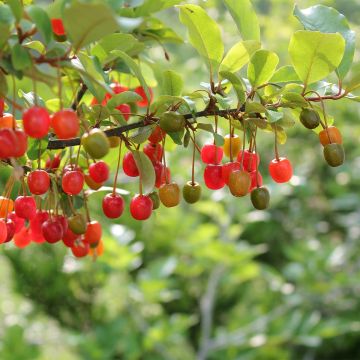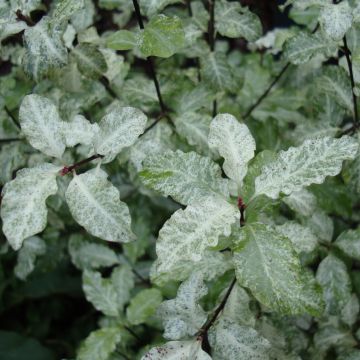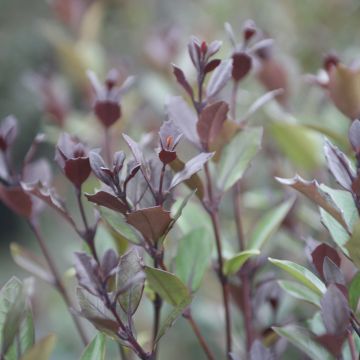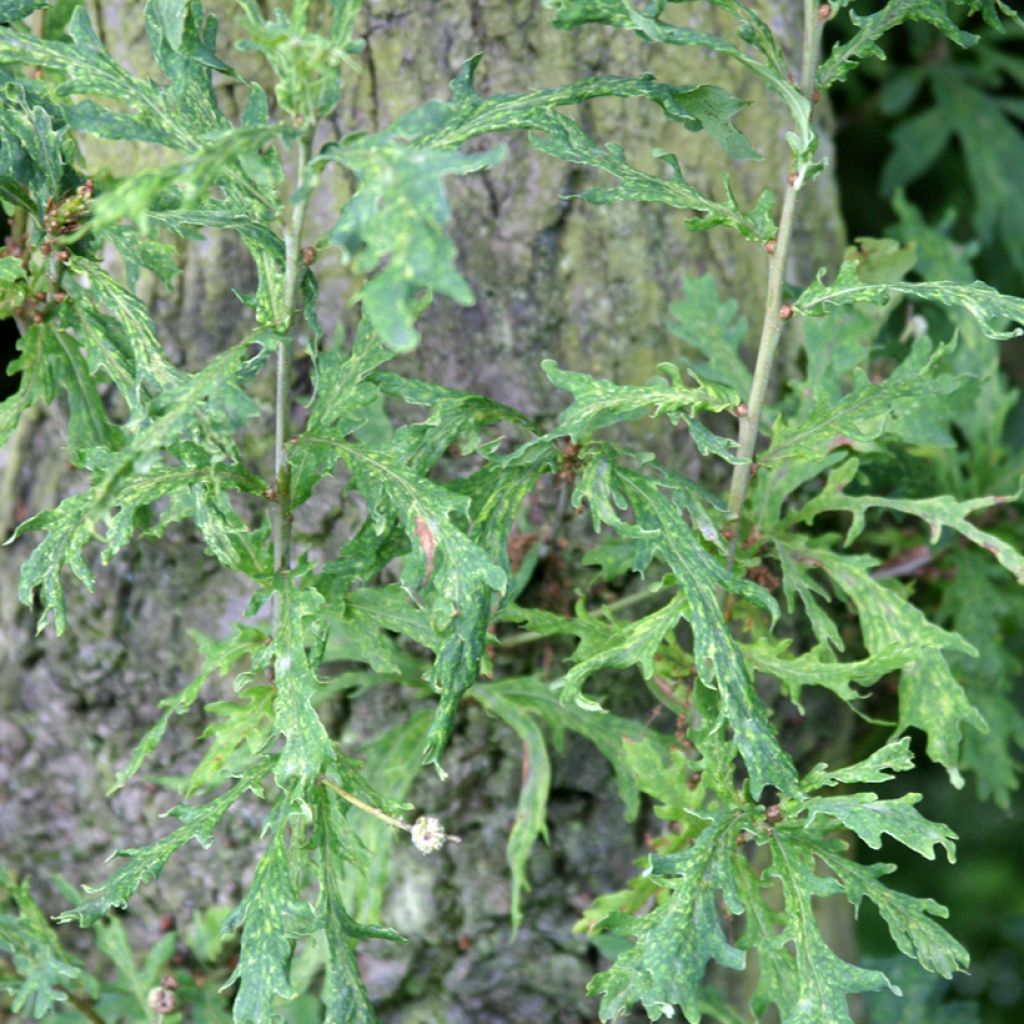

Quercus robur Strypemonde - English oak
Quercus robur Strypemonde - English oak
Quercus robur Strypemonde
English oak, Pedunculate oak
Special offer!
Receive a €20 voucher for any order over €90 (excluding delivery costs, credit notes, and plastic-free options)!
1- Add your favorite plants to your cart.
2- Once you have reached €90, confirm your order (you can even choose the delivery date!).
3- As soon as your order is shipped, you will receive an email containing your voucher code, valid for 3 months (90 days).
Your voucher is unique and can only be used once, for any order with a minimum value of €20, excluding delivery costs.
Can be combined with other current offers, non-divisible and non-refundable.
Home or relay delivery (depending on size and destination)
Schedule delivery date,
and select date in basket
This plant carries a 24 months recovery warranty
More information
We guarantee the quality of our plants for a full growing cycle, and will replace at our expense any plant that fails to recover under normal climatic and planting conditions.
Would this plant suit my garden?
Set up your Plantfit profile →
Description
Quercus robur 'Strypemonde' is an unusual and astonishing variety of pedunculate oak. It stands out for its fanciful, twisted, very long, pendulous leaves with fringed edges. Its irregular pigmentation appears on the leaf in the form of bands or cream-white streaks. This small oak grows quite slowly and maintains modest dimensions, which allows for a better appreciation of the tree's leaves. Planting it in an isolated, sunny location is ideal, to allow for lush growth and the opportunity to admire this unusual oak up close.
The Oak tree is a member of the Fagaceae family, like the Beech and the Chestnut. It has approximately 600 species worldwide, both deciduous and evergreen, mainly in the northern hemisphere, in arid, temperate, or humid tropical climates. The Quercus genus particularly inspires collectors, as it is rich in diversity, like the Chestnut-leaved Oak... There are estimated to be around 240 named cultivars, such as Strypemonde.
This variety, cherished by collectors and rare in cultivation, reaches a height of 6 to 10 metres with a width of 6 metres. Its silhouette is essentially the same as that of the Oak tree found in the countryside, it is primarily the foliage that sets it apart. It bears large, very long, relatively narrow leaves, with rounded lobes on each side, of irregular size. When they emerge, the leaves are speckled with yellow, then as they age, they become tougher and the yellow turns to cream, then white. The young leaves are the most colourful, as they age, the proportion of green becomes predominant over the white. Due to their size, the leaves carried by short petioles hang downward. The bark of young branches is a tender green, somewhat yellow, and gradually darkens to become brownish like the trunk bark. The rather insignificant flowering in spring produces the same acorns as the species.
This Oak tree needs a sunny exposure for a more complete crown development and better coloration of the white spots on the leaves. It is rather accommodating regarding soil pH, accepting moderately chalky to slightly acidic soils. However, it needs a certain amount of humidity and a humus-bearing, fertile soil to thrive.
Quercus robur 'Strypemonde' is best appreciated when planted in isolation to fully appreciate its uniqueness, in highly exposed areas or along pathways. It will delight lovers of bizarre foliage. It can be planted in front of a backdrop of dark green vegetation, such as conifers, to better enjoy its beautiful mottled variegation. Highly aesthetic, it can be planted as a standalone specimen in the middle of a lawn.
Report an error about the product description
Quercus robur Strypemonde - English oak in pictures
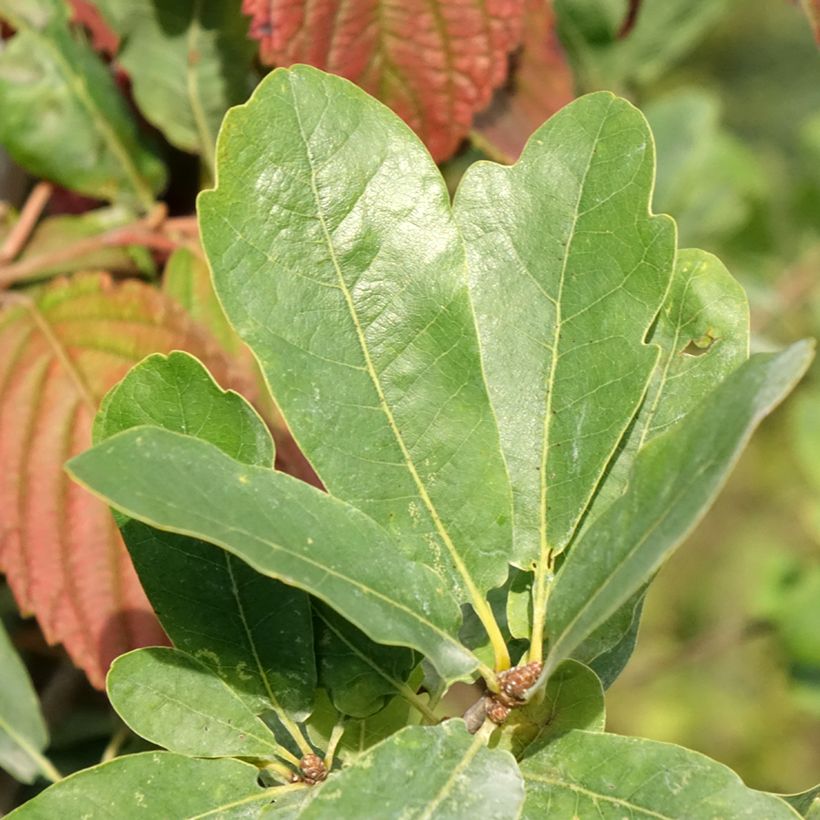

Plant habit
Flowering
Foliage
Botanical data
Quercus
robur
Strypemonde
Fagaceae
English oak, Pedunculate oak
Quercus robur var. x Strypemonde
Cultivar or hybrid
Planting and care
Quercus robur Strypemonde grows in ordinary, but deep and preferably clayey, slightly calcareous, neutral or slightly acidic soil. It prefers fertile and humus-bearing soils. Once established, this tree with deep roots can withstand normal summers and does not require watering. It appreciates moist but well-drained soils, where its growth will be faster. In poor and dry soils, its growth will be slower. It prefers very sunny and well-exposed locations, which promote remarkably colourful foliage. Soak the root ball in a bucket of water for a quarter of an hour to thoroughly saturate it before planting, place it in the planting hole, backfill around it and water abundantly. Place a sturdy stake to help it start, water for the first two years, then let nature take its course. Once established, this tree requires very little maintenance other than removing dead wood. It is not very prone to diseases.
Planting period
Intended location
Care
This item has not been reviewed yet - be the first to leave a review about it.
Similar products
Haven't found what you were looking for?
Hardiness is the lowest winter temperature a plant can endure without suffering serious damage or even dying. However, hardiness is affected by location (a sheltered area, such as a patio), protection (winter cover) and soil type (hardiness is improved by well-drained soil).

Photo Sharing Terms & Conditions
In order to encourage gardeners to interact and share their experiences, Promesse de fleurs offers various media enabling content to be uploaded onto its Site - in particular via the ‘Photo sharing’ module.
The User agrees to refrain from:
- Posting any content that is illegal, prejudicial, insulting, racist, inciteful to hatred, revisionist, contrary to public decency, that infringes on privacy or on the privacy rights of third parties, in particular the publicity rights of persons and goods, intellectual property rights, or the right to privacy.
- Submitting content on behalf of a third party;
- Impersonate the identity of a third party and/or publish any personal information about a third party;
In general, the User undertakes to refrain from any unethical behaviour.
All Content (in particular text, comments, files, images, photos, videos, creative works, etc.), which may be subject to property or intellectual property rights, image or other private rights, shall remain the property of the User, subject to the limited rights granted by the terms of the licence granted by Promesse de fleurs as stated below. Users are at liberty to publish or not to publish such Content on the Site, notably via the ‘Photo Sharing’ facility, and accept that this Content shall be made public and freely accessible, notably on the Internet.
Users further acknowledge, undertake to have ,and guarantee that they hold all necessary rights and permissions to publish such material on the Site, in particular with regard to the legislation in force pertaining to any privacy, property, intellectual property, image, or contractual rights, or rights of any other nature. By publishing such Content on the Site, Users acknowledge accepting full liability as publishers of the Content within the meaning of the law, and grant Promesse de fleurs, free of charge, an inclusive, worldwide licence for the said Content for the entire duration of its publication, including all reproduction, representation, up/downloading, displaying, performing, transmission, and storage rights.
Users also grant permission for their name to be linked to the Content and accept that this link may not always be made available.
By engaging in posting material, Users consent to their Content becoming automatically accessible on the Internet, in particular on other sites and/or blogs and/or web pages of the Promesse de fleurs site, including in particular social pages and the Promesse de fleurs catalogue.
Users may secure the removal of entrusted content free of charge by issuing a simple request via our contact form.
The flowering period indicated on our website applies to countries and regions located in USDA zone 8 (France, the United Kingdom, Ireland, the Netherlands, etc.)
It will vary according to where you live:
- In zones 9 to 10 (Italy, Spain, Greece, etc.), flowering will occur about 2 to 4 weeks earlier.
- In zones 6 to 7 (Germany, Poland, Slovenia, and lower mountainous regions), flowering will be delayed by 2 to 3 weeks.
- In zone 5 (Central Europe, Scandinavia), blooming will be delayed by 3 to 5 weeks.
In temperate climates, pruning of spring-flowering shrubs (forsythia, spireas, etc.) should be done just after flowering.
Pruning of summer-flowering shrubs (Indian Lilac, Perovskia, etc.) can be done in winter or spring.
In cold regions as well as with frost-sensitive plants, avoid pruning too early when severe frosts may still occur.
The planting period indicated on our website applies to countries and regions located in USDA zone 8 (France, United Kingdom, Ireland, Netherlands).
It will vary according to where you live:
- In Mediterranean zones (Marseille, Madrid, Milan, etc.), autumn and winter are the best planting periods.
- In continental zones (Strasbourg, Munich, Vienna, etc.), delay planting by 2 to 3 weeks in spring and bring it forward by 2 to 4 weeks in autumn.
- In mountainous regions (the Alps, Pyrenees, Carpathians, etc.), it is best to plant in late spring (May-June) or late summer (August-September).
The harvesting period indicated on our website applies to countries and regions in USDA zone 8 (France, England, Ireland, the Netherlands).
In colder areas (Scandinavia, Poland, Austria...) fruit and vegetable harvests are likely to be delayed by 3-4 weeks.
In warmer areas (Italy, Spain, Greece, etc.), harvesting will probably take place earlier, depending on weather conditions.
The sowing periods indicated on our website apply to countries and regions within USDA Zone 8 (France, UK, Ireland, Netherlands).
In colder areas (Scandinavia, Poland, Austria...), delay any outdoor sowing by 3-4 weeks, or sow under glass.
In warmer climes (Italy, Spain, Greece, etc.), bring outdoor sowing forward by a few weeks.


































